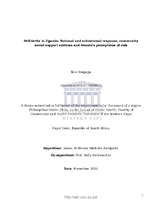Stillbirths in Uganda: National and subnational response, community social support systems and women’s perceptions of risk
Abstract
This thesis is an exploratory project on the stillbirth challenges in Uganda. It approaches the subject matter from a global policy perspective to local implementation experiences and community responses. From 2010, accelerated global concern over the stillbirth burden has reflected a lack of proportionate advocacy and attention relative to the magnitude compared to other public health challenges such as HIV/AIDS. At the time of conceptualisation, over 2.6 million stillbirths were occurring annually across the globe, with the majority of the cases in low- and middle-income countries, including sub-Saharan Africa. Many of the cases were happening around the time of delivery although they could have been preventable. This public health concern is examined through the critical lens of the policy transfer theory, a bottom-up implementation theory of street-level bureaucracy, community response through a social network analysis approach and risk perception theories for women’s understanding of stillbirth risks.

